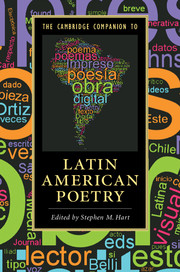Book contents
- The Cambridge Companion to Latin American Poetry
- The Cambridge Companion to Latin American Poetry
- Copyright page
- Contents
- Illustrations
- Notes on Contributors
- Preface
- Chronology
- Part I History
- Part II Six Key Figures
- Part III Diversity and Heterogeneity
- 12 Women’s Poetry
- 13 LGBTQ Poetry
- 14 Quechua/Kichwa Poetry
- 15 Afro-Hispanic Poetry
- 16 U.S. Latino/a Poetry
- 17 (New) Media Poetry
- 18 English Translations
- Guide to Further Reading
- Select Bibliography
- Index
- Cambridge Companions to ...
14 - Quechua/Kichwa Poetry
from Part III - Diversity and Heterogeneity
Published online by Cambridge University Press: 09 March 2018
- The Cambridge Companion to Latin American Poetry
- The Cambridge Companion to Latin American Poetry
- Copyright page
- Contents
- Illustrations
- Notes on Contributors
- Preface
- Chronology
- Part I History
- Part II Six Key Figures
- Part III Diversity and Heterogeneity
- 12 Women’s Poetry
- 13 LGBTQ Poetry
- 14 Quechua/Kichwa Poetry
- 15 Afro-Hispanic Poetry
- 16 U.S. Latino/a Poetry
- 17 (New) Media Poetry
- 18 English Translations
- Guide to Further Reading
- Select Bibliography
- Index
- Cambridge Companions to ...
Summary
- Type
- Chapter
- Information
- The Cambridge Companion to Latin American Poetry , pp. 210 - 226Publisher: Cambridge University PressPrint publication year: 2018



